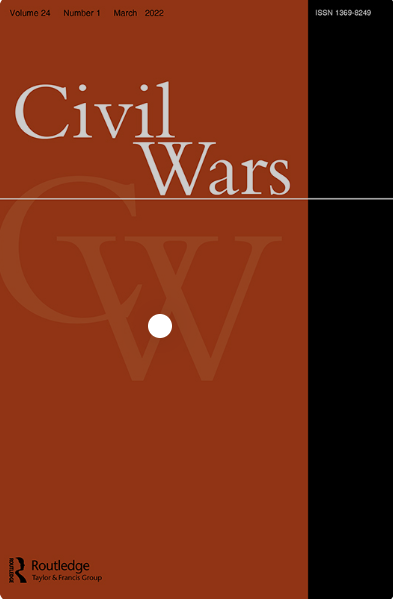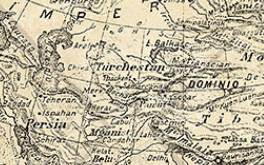CACI director Svante Cornell's interviewed on the 'John Batchelor Show' podcast regarding Turkey's 2023 presidential election
Listen to CACI director Svante Cornell's recent interview on the 'John Batchelor Show' podcast regarding Turkey's 2023 presidential election. Click here!
Promise and Peril in the Caucasus
By Svante Cornell
March 30, 2023
https://www.afpc.org/publications/articles/promise-and-peril-in-the-caucasus
On January 27th, a gunman entered Azerbaijan’s embassy in Tehran, Iran, killed the embassy security officer and wounded two others. The episode received only fleeting coverage in the international media. In the wake of the incident, Azerbaijan’s President, Ilham Aliyev, openly accused “some of the branches of the Iranian establishment” of being responsible for the attack, and Baku promptly evacuated its embassy staff and dependents. It was a clear sign of the frictions between Azerbaijan and its not-so-friendly neighbor, Iran.
To be sure, relations between the two countries had deteriorated sharply since the fall of 2020, when Azerbaijan, using mainly Turkish and Israeli weaponry, succeeded in taking back territories long occupied by regional rival Armenia. In that conflict, Iran had played a distinctly unhelpful role, seeking to stall Azerbaijan’s military advances and providing covert support for Armenia. But the incident itself, as well as its fallout, is indicative of a larger realignment of power politics now underway in Eurasia – one with immense implications for U.S. interests.
Over the past two years, regional events have highlighted the importance of the Caucasus, the narrow isthmus between Iran and Russia that connects Europe to Central Asia through the Black and Caspian seas. America’s ill-conceived withdrawal from Afghanistan shut down hopes that landlocked Central Asian states would be able to open transport routes through that country, thereby connecting to the Indian subcontinent and the Indian ocean. Then, Russia’s invasion of Ukraine abruptly shut down the land transport corridor linking China to Europe through Kazakhstan, Russia and Belarus. Suddenly, the only land route linking China and Central Asia to Europe is the one that passes through the Caucasus.
But while America has paid increasing attention to Central Asia in recent years – Secretary of State Antony Blinken visited the region in February – it has all but ignored the three countries of the Caucasus. This, in spite of the region’s growing importance in relation to Central Asia, and to the countering of Iran.
Indeed, the Caucasus is a region where alignments don’t fit easily into preconceived notions. Iran has supported Christian Armenia against Muslim Azerbaijan, largely because up to a third of Iran’s own population consists of Turkic-speaking Azerbaijanis, whom Iran fears may seek to separate and join up with their northern brethren. Conversely, Israel has developed strong relations with Azerbaijan, capitalizing on the staunchly secular nature of Azerbaijani society and its government’s efforts to promote inter-religious harmony. Israeli drone technology, for instance, was critical to Azerbaijan’s victory in the 2020 war.
Turkey’s shift has been dramatic, too. A decade ago, Islamist impulses led the Turkish government of President Recep Tayyip Erdogan to pursue an accommodation with Iran while expanding the country’s stature in the Middle East. Turkey’s support for political Islam, in turn, led to the collapse of its relations with Israel, Egypt, Saudi Arabia and the United Arab Emirates. But the war in Syria put Turkey and Iran on a collision course, while changing domestic politics over the past half decade have led Istanbul to adopt a foreign and security policy heavily influenced by the nationalist (rather than Islamist) preferences.
As a result, Turkey has mended fences with Arab nations and with Israel – a process that has been facilitated by Azerbaijan, which managed to keep excellent relations with both Jerusalem and Ankara throughout. More important, from an American perspective, is the fact that Ankara has emerged as the strongest regional counterweight to Iran. Last December, the Turkish defense minister supervised joint military exercises along the Azerbaijani border with Iran, responding to drills that Tehran had organized only weeks prior in which Iranian forces practiced an invasion of Azerbaijan. Turkey and Azerbaijan now have a defense pact – something that has enabled Baku to speak up against Tehran in ways that were unthinkable a year ago.
Then there is Armenia. While Turkey and Azerbaijan are joining forces with Israel to counter Tehran, Yerevan finds itself stuck in an entente with both Tehran and Moscow dating back to the 1990s. Armenian Prime Minister Nikol Pashinyan has making noises about escaping Russia’s orbit of late, launching overtures to the U.S. and the European Union. But Russian influence in Armenia’s national security bureaucracy remains strong, as does Russian ownership of critical infrastructure in the country. More worrying is the fact that Armenia appears to have played a critical role in Iran’s transfer of drones and missiles to Russia for its war in Ukraine.
In the middle of it all is Georgia, previously America’s closest partner in the region. But in recent years, Georgia’s government – now under the control of a shadowy tycoon who made his fortune in Russia in the 1990s – has become increasingly skeptical of the West.
America’s national security bureaucracy separates the Caucasus and the Middle East into different bureaus, with Central Asia in yet another office. This is part of the reason the U.S. has failed to respond to the ways in which the regional politics of these regions intertwine. In view of the challenges posed by Russia and Iran, however, Washington’s confusion is no longer tenable. It is in America’s interest to encourage Turkey’s emergence as a counterweight to Iran, and to nurture the growing alignment between Ankara, Baku and Jerusalem. The U.S. also needs to work to recover its influence in Georgia, as well as to reinforce the efforts it began in late 2022 to bring about a peace agreement between Armenia and Azerbaijan. All of the above, however, requires a much stronger American commitment to the security and stability of the countries of the Caucasus.
Svante E. Cornell is the Director of AFPC’s Central Asia-Caucasus Institute.
Click here to download publication PDF
Religion as a Factor in Caucasian Conflicts
Svante E. Cornell
Civil Wars,
Vol. 1 no. 3, 1998
 The many conflicts that have raged in the Caucasus since the end of the 1980s have often been depicted in the media and academia as basically religous in character. The religious differences between parties to conflicts are empjasized and often exaggerated. In particular, the Caucasus has been taken as an example of the 'clash of civilzations' supposedly under way. This article seeks to challenge this perception of the Caucasian conflicts, arguing that religion has played a limited role in conflicts that are actually ehnopolitical and territorial in character. The article argues that seldom are religious bodies of thinking used to legitimize conflict behaviour in this region -- there has been no Jihad in the Caucasus, for example -- nor has the politicization of the parties to a conflict been underpinned primarily by religious identity or theological perspetives. As such, religious conflict can not be spoken of. Furthermore ther has occured no rallying of outside powers along religious lines; quite to the contrary empirical evidence shows hat religious has had little impact -- especially when compared to ethnicity -- in the international ramifications of these conflicts.
The many conflicts that have raged in the Caucasus since the end of the 1980s have often been depicted in the media and academia as basically religous in character. The religious differences between parties to conflicts are empjasized and often exaggerated. In particular, the Caucasus has been taken as an example of the 'clash of civilzations' supposedly under way. This article seeks to challenge this perception of the Caucasian conflicts, arguing that religion has played a limited role in conflicts that are actually ehnopolitical and territorial in character. The article argues that seldom are religious bodies of thinking used to legitimize conflict behaviour in this region -- there has been no Jihad in the Caucasus, for example -- nor has the politicization of the parties to a conflict been underpinned primarily by religious identity or theological perspetives. As such, religious conflict can not be spoken of. Furthermore ther has occured no rallying of outside powers along religious lines; quite to the contrary empirical evidence shows hat religious has had little impact -- especially when compared to ethnicity -- in the international ramifications of these conflicts.
CACI Forum: Turkey and the Russia-Ukraine War: Impact on Central Asia and the Caucasus
Turkey is trying to avoid openly taking sides in the war of Russia against Ukraine. While condemning the Russian invasion and supplying Bayraktar drones to Ukraine, Turkey did not join the economic sanctions against Russia and in fact may seek to benefit from the Western sanctions against Russia, all while acting as a facilitator of negotiations between the parties. The backdrop of Turkey’s actions is gradually growing Turkish influence in the Caucasus and Central Asia. In this forum, speakers will address how Turkey’s strategy affects the wider region from Eastern Europe to Western China.
Date: April 20, 2022, 10.00 AM, EST.
Speakers:
- Ambassador Matthew Bryza, Board Member, Jamestown Foundation\
- Suat Kiniklioglu, Former Member of the Turkish Parliament
- Svante Cornell, Director, Central Asia-Caucasus Institute at the American Foreign Policy Council
Moderator:
Fred Starr, Chairman, Central Asia-Caucasus Institute at the American Foreign Policy Council
Register for the Zoom webinar: https://us02web.zoom.us/webinar/register/WN_nvN2Lu0ZROKoZASfi8Su1w
The event will also be live-streamed on the CACI Facebook page and here on the Silk Road Studies website.
New Article Series on Changing Geopolitics of Central Asia and the Caucasus



